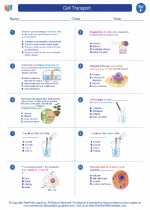Glucose
Glucose is a simple sugar and one of the most important carbohydrates. It is a primary source of energy for living organisms and is particularly important for the human body as it is the main fuel for the brain. Glucose is produced through the process of photosynthesis in plants and is also obtained from the breakdown of carbohydrates in food.
Structure of Glucose
Glucose is a monosaccharide, meaning it is made up of a single sugar unit. Its chemical formula is C6H12O6. Glucose molecules are arranged in a ring structure, with each molecule containing six carbon atoms, twelve hydrogen atoms, and six oxygen atoms.
Functions of Glucose
Glucose serves as the primary source of energy for the body's cells. When consumed, it is broken down during cellular respiration to produce ATP (adenosine triphosphate), which is the energy currency of the cell. Glucose also plays a vital role in maintaining blood sugar levels, and any excess glucose is stored in the liver and muscles as glycogen for later use.
Importance of Glucose
Glucose is essential for the proper functioning of the body. It provides energy for various cellular processes, including muscle contraction, nerve impulse transmission, and synthesis of biomolecules. It is also crucial for brain function, as the brain relies heavily on glucose for its energy needs.
Study Guide
- What is the chemical formula of glucose?
- What is the primary source of glucose in the human body?
- Describe the structure of a glucose molecule.
- What is the main function of glucose in the body?
- How is excess glucose stored in the body?
- Why is glucose important for brain function?
By understanding the structure and functions of glucose, you can appreciate its significance as a vital component for sustaining life and maintaining bodily functions.
[Glucose] Related Worksheets and Study Guides:
.◂Science Worksheets and Study Guides Sixth Grade. Cell Transport

 Worksheet/Answer key
Worksheet/Answer key
 Vocabulary/Answer key
Vocabulary/Answer key
 Vocabulary/Answer key
Vocabulary/Answer key
